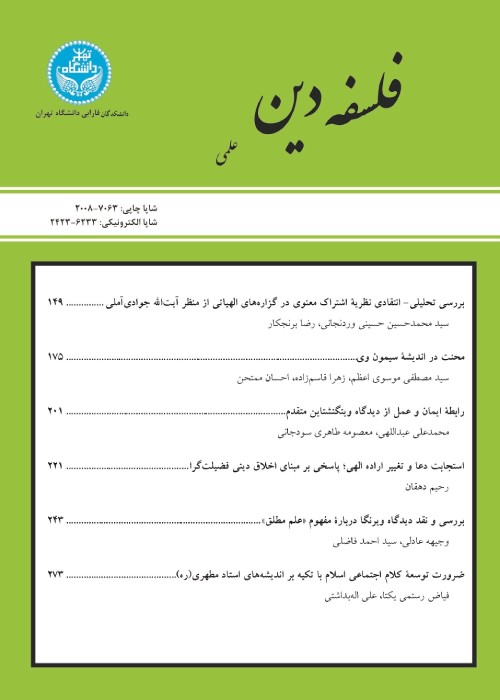Religion in Early Wittgenstein Philosophy
Author(s):
Abstract:
Ludwig Josef Johann Wittgenstein is one of the famous analytic philosophers of the twentieth century. He is in this belief that ethics and religion are beyond the boundaries of language. So, whereof one cannot speak, thereof one must be silent. His notion about religion in his early period of his life is concise and ambiguous. For this reason, exponents and commentators of his writings adopted two different positions. Some draw a religious picture of him while some others know him as an unbeliever.
The aim of the present paper is to explore Wittgensteins writing in the first period of his lifes in order to understand his stand point about God and religion. The main question of the article is what religion means from his view point? If religion is equivalent to the belief in God or the practice of religious virtues as believers know or is it something equal to ethics? Owing to the conciseness of the Wittgensteins writings, we have tried to use the ideas of other explainers such as Norman Malcolm and Cyril Barrett.
The aim of the present paper is to explore Wittgensteins writing in the first period of his lifes in order to understand his stand point about God and religion. The main question of the article is what religion means from his view point? If religion is equivalent to the belief in God or the practice of religious virtues as believers know or is it something equal to ethics? Owing to the conciseness of the Wittgensteins writings, we have tried to use the ideas of other explainers such as Norman Malcolm and Cyril Barrett.
Keywords:
Language:
Persian
Published:
Journal of Philosophy of Religion, Volume:13 Issue: 3, 2016
Pages:
505 to 532
magiran.com/p1642200
دانلود و مطالعه متن این مقاله با یکی از روشهای زیر امکان پذیر است:
اشتراک شخصی
با عضویت و پرداخت آنلاین حق اشتراک یکساله به مبلغ 1,390,000ريال میتوانید 70 عنوان مطلب دانلود کنید!
اشتراک سازمانی
به کتابخانه دانشگاه یا محل کار خود پیشنهاد کنید تا اشتراک سازمانی این پایگاه را برای دسترسی نامحدود همه کاربران به متن مطالب تهیه نمایند!
توجه!
- حق عضویت دریافتی صرف حمایت از نشریات عضو و نگهداری، تکمیل و توسعه مگیران میشود.
- پرداخت حق اشتراک و دانلود مقالات اجازه بازنشر آن در سایر رسانههای چاپی و دیجیتال را به کاربر نمیدهد.
In order to view content subscription is required
Personal subscription
Subscribe magiran.com for 70 € euros via PayPal and download 70 articles during a year.
Organization subscription
Please contact us to subscribe your university or library for unlimited access!


